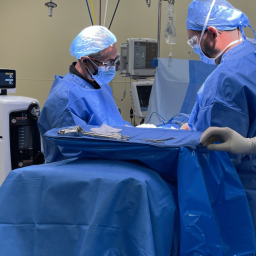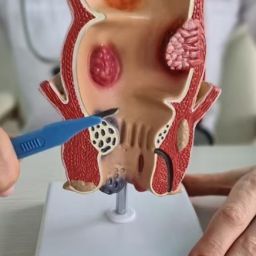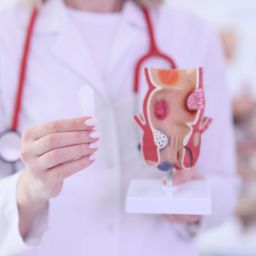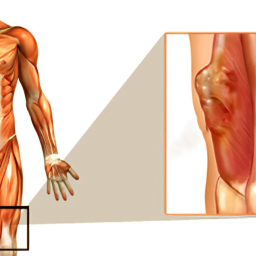
1. The Relationship Between Fluid Intake and Digestive Health
The digestive system is a complex network that depends on a variety of factors to function properly. One of the most important of these factors is adequate fluid intake. Fluids help with the digestion and absorption of nutrients, support the proper functioning of the intestines, and facilitate the smooth passage of waste through the digestive tract.
1.1 Hydration and Bowel Movement
The human body is composed of approximately 60% water, and it relies on water for many vital processes, including digestion. Hydration plays a significant role in maintaining the proper consistency of stool. The intestines absorb water as food moves through the digestive tract, and this water is essential in forming soft, easy-to-pass stools. Inadequate hydration can lead to hard, dry stools, which may cause difficulty during bowel movements.

- Constipation: One of the most common proctological problems related to inadequate fluid intake is constipation. When the body is dehydrated, the colon absorbs too much water from the stool, resulting in hard, dry stools that are difficult to pass. This leads to straining during bowel movements, which can worsen symptoms in individuals with hemorrhoids or anal fissures.
- Stool Consistency: Proper hydration ensures that the stool remains soft and well-formed, which is essential for healthy bowel movements. Soft stools reduce the need for excessive straining, thus preventing damage to the anal area and minimizing the risk of developing hemorrhoids or fissures.
1.2 Fluid Intake and Colon Function
The colon, also known as the large intestine, plays a crucial role in absorbing water and electrolytes from the food we eat. When the colon receives an adequate amount of fluids, it functions efficiently, absorbing the necessary water and forming well-formed stools. However, when fluid intake is insufficient, the colon can become less efficient, leading to dehydration of the stool and constipation.
- Gut Motility: Adequate hydration helps maintain normal colon motility, ensuring that food moves smoothly through the digestive system. Dehydration can result in sluggish bowel movements, further contributing to constipation and increasing the risk of proctological disorders.
- Electrolyte Balance: Fluids, especially water, play a role in maintaining the balance of electrolytes in the body. Proper electrolyte balance is essential for the smooth functioning of muscles, including the muscles of the digestive tract. Dehydration can disrupt this balance, impairing bowel function and leading to digestive issues.
2. Fluid Intake and Hemorrhoids
Hemorrhoids are one of the most common proctological conditions, and they are often exacerbated by constipation and straining during bowel movements. Hemorrhoids are swollen blood vessels in the rectum or anus, and they can cause pain, itching, bleeding, and discomfort.
One of the primary causes of hemorrhoids is excessive straining during bowel movements, which can occur as a result of constipation. Dehydration, by making the stool harder and more difficult to pass, can increase the likelihood of straining. Ensuring proper fluid intake can help prevent hemorrhoids by:
- Promoting Soft Stools: Hydration helps maintain soft stools, which reduces the need for straining during bowel movements. By preventing constipation, proper fluid intake can minimize the pressure placed on the rectal veins and lower the risk of developing hemorrhoids.
- Reducing Inflammation: Dehydration can increase the intensity of symptoms associated with hemorrhoids, such as swelling and discomfort. Staying hydrated helps reduce inflammation and supports the healing process for those already suffering from hemorrhoids.
3. Fluid Intake and Anal Fissures
Anal fissures are small tears in the skin around the anus, often caused by passing hard stools. These tears can be extremely painful and may result in bleeding during bowel movements. Like hemorrhoids, anal fissures are often associated with constipation and straining.
- Preventing Straining: Just like with hemorrhoids, proper fluid intake ensures that the stool remains soft and easily passable, which reduces the likelihood of straining and tearing the delicate skin around the anus. Hydration, therefore, plays a crucial role in preventing and managing anal fissures.
- Promoting Healing: Adequate hydration can also help speed up the healing process for existing anal fissures. Proper fluid levels ensure that the body has the necessary resources to repair damaged tissues and reduce inflammation.
4. Fluid Intake and Proctitis
Proctitis refers to the inflammation of the lining of the rectum, which can result from infections, inflammatory bowel disease (IBD), or radiation therapy. Dehydration can worsen the symptoms of proctitis, leading to increased inflammation, pain, and discomfort.

- Maintaining Fluid Balance: Proctitis can cause diarrhea and frequent bowel movements, which can lead to dehydration. In such cases, it is important to increase fluid intake to prevent further complications. Drinking enough fluids helps maintain hydration, preventing dehydration-related symptoms such as fatigue, dizziness, and dry skin.
- Supporting Tissue Repair: Inflammatory conditions like proctitis benefit from adequate hydration as fluids help in the repair and regeneration of the affected tissue. Water also helps remove toxins from the body, contributing to overall healing.
5. Fluid Intake Recommendations for Proctological Health
The amount of fluid needed for optimal proctological health varies depending on individual factors such as age, activity level, climate, and overall health. However, general guidelines can be followed to ensure proper hydration:
- Recommended Water Intake: The National Academies of Sciences recommends that men consume about 3.7 liters (125 ounces) of total water per day, while women should aim for 2.7 liters (91 ounces) of total water daily, including all beverages and food sources.
- Adequate Fiber and Fluid Balance: It’s important to combine adequate fluid intake with a diet rich in fiber. Fiber adds bulk to stool, while fluids help soften the stool, making bowel movements easier. A balance of fiber and fluid helps maintain optimal digestive function and prevents constipation.
- Increased Fluid Intake During Illness: If a person is suffering from diarrhea or vomiting due to gastrointestinal illness, it is important to increase fluid intake to compensate for lost fluids and electrolytes. Drinking water, electrolyte-rich drinks, and broths can help maintain hydration levels and prevent dehydration.
6. Other Fluids and Hydration Sources
While water is the most effective fluid for hydration, there are other beverages and foods that can contribute to overall fluid intake:
- Herbal Teas: Herbal teas such as chamomile or peppermint can be soothing for the digestive system and contribute to hydration.
- Coconut Water: Coconut water is a natural source of electrolytes and can help maintain fluid balance, especially during hot weather or after exercise.
- Fruits and Vegetables: Many fruits and vegetables, such as watermelon, cucumbers, and oranges, have high water content and can contribute to hydration.
- Broths and Soups: Broths made from vegetables, chicken, or beef provide fluids along with nutrients and electrolytes.
7. Potential Risks of Overhydration
While dehydration is a significant concern, overhydration (also known as water intoxication or hyponatremia) can also be harmful. Drinking excessive amounts of water in a short period can dilute the sodium levels in the body, leading to dangerous electrolyte imbalances. Therefore, it is important to drink water in moderation and listen to your body’s needs.
Fluid intake plays a vital role in maintaining proctological health, influencing the consistency of stool, reducing constipation, and preventing or managing proctological conditions such as hemorrhoids, anal fissures, and proctitis. Proper hydration supports the digestive system, improves bowel movements, and enhances overall gastrointestinal function. To maintain proctological health, it is essential to drink an adequate amount of water and combine this with a diet high in fiber. Additionally, increased fluid intake is crucial for individuals suffering from digestive disorders or dehydration due to illness. While hydration is critical, it is equally important to avoid overhydration, which can lead to other health complications.







